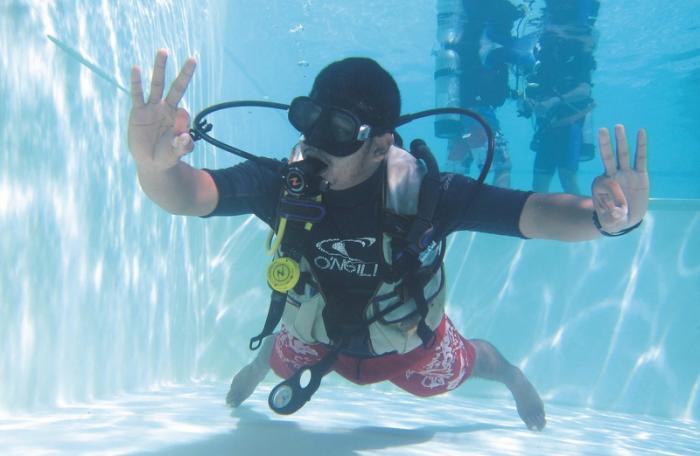Diving: Safety regulations in the dive industry

PHUKET: As promised, let’s dig into two of the biggest questions professionals in the industry are faced with in Phuket: “can we bend the rules to take photos on a Discover Scuba Diving (DSD) course” and “what counts as a ‘confined water environment’ for DSD”.
Even at the PADI seminar on March 8 (story here), which included some of the most interested and concerned PADI professionals on the island with regards to violations of regulations in Phuket, these questions were floated, with the instructors outlining ways in which perhaps regulations could be circumvented.
Before diving in, it’s necessary to understand why the questions are being asked in the first place. Despite living costs in Phuket skyrocketing, the salaries for those in the dive industry haven’t really budged in more than a decade. However, snapping a few photos of a DSD student while underwater provides an instructor with some additional revenue, allowing them to make more than 3,000 baht a day in some cases.
One such example of bending the rules that was aired at the meeting was whether or not a DSD student could be loaned a camera or bring their own camera on the dive – thus not violating the rule that states that instructors should not bring a camera while managing uncertified divers in a foreign environment.
The simple answer provided by Robert J Scammell, a PADI instructor examiner, at the seminar was, “No”. Having been an expert witness for the prosecution in diving related cases in the past, Mr Scammell illustrated how easy it is to decide on whether or not something is in line with regulations.
Simply ask yourself, if there was an accident, how would these actions appear in the black and white of a police report? Are any of the justifications used to make something an acceptable level of gray going to hold up as ‘prudent judgment’ in the court of law?
An instructor’s first priority should neither be making more money, nor should it be having a happy client – it is the student’s safety. The instructor taking pictures of a student on a DSD course, or after it, is in violation of regulations, as it puts the uncertified diver at an increased level of risk.
Additionally, handing a camera to someone who has just learned to breathe underwater and has no sense of buoyancy is just as irresponsible. If an accident does occur underwater – which has happened too often in the region recently – it would be very hard for a judge and jury to see such an action as one that would have been taken by a ‘prudent’ instructor.
That is the key, as within the industry, the underlying rule for all certified dive professionals is whether or not the actions were in line with those of a ‘prudent’ professional. So, if pictures are essential to a customer enjoying their underwater experience, an instructor is better off coordinating with an on-boat photographer and just skimming commissions off the top.
The same process of determining prudence can be applied to whether or not a dive site is a ‘confined water environment’. One doesn’t have to listen to a dive instructor griping for very long to hear about people feeling forced by dive companies and tour agencies on the island to do DSD courses in the strong currents that often rip across King Cruiser.
A closed water environment, required for a DSD course, is a pool or site that offers ‘pool like conditions’ in regards to clarity, calmness and depth – it should be shallow enough to stand in. Of course, this means DSD courses could easily be held in some of the Racha Island bays. However, King Cruiser with a max depth of about 30 meters would require an extremely tall student for it to be considered ‘shallow enough to stand in’.
“Standards for ratios and depths are listed as maximum limits. This means that you must apply sound
judgment in determining what is appropriate for training each time you conduct a course or program,” the PADI instructor manual states. This means that even if something isn’t clearly banned by the manual, such as bringing your dog diving on a DSD course, the responsibility to know that it is an unsafe idea comes back to the dive instructor.
“The PADI Discover Scuba Diving program introduces people to scuba diving in a highly supervised, controlled and relaxed manner. It dispels common misconceptions about scuba by letting individuals try it for themselves,” states PADI’s Guide to Teaching. “These participants need and deserve a high level of patience, attention and sensitivity, both for their safety and for their enjoyment of the program. The real reward for the PADI professional offering the Discover Scuba Diving program is the day-to-day opportunity to guide people through, and share with them, a truly remarkable experience in discovering diving.”
However, the tough reality of the industry is that if you turn down the work, there is always another diving instructor or dive master willing to step in for a day’s wages. So, despite individual diving professionals being fully responsible for the consequences of their imprudent judgment, change must come from dive operations, which can ensure that DSD are being taken to appropriate dive locations and instructors are paired with cameramen on the dives. This way, everyone gets a little more cash and the budding scuba divers have a safer, more enjoyable experience, perhaps getting hooked on the underwater wonders that has drawn countless thousands below the surface of the Andaman.
— Isaac Stone Simonelli
Latest Thailand News
Follow The Thaiger on Google News:


























